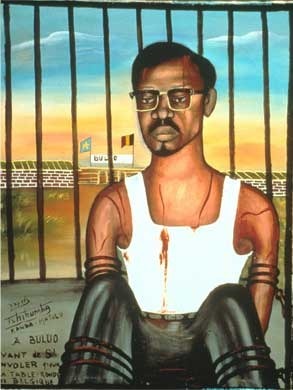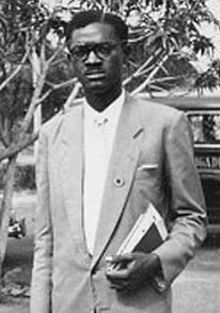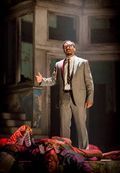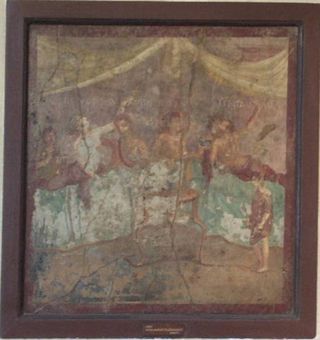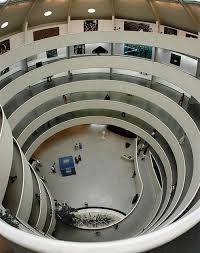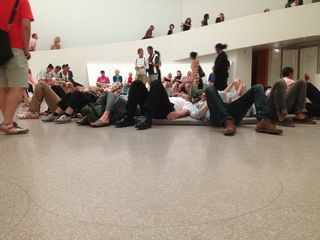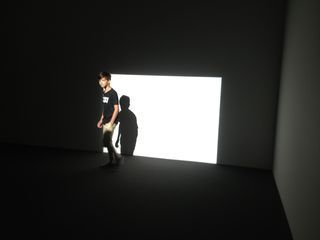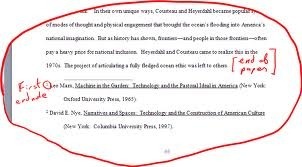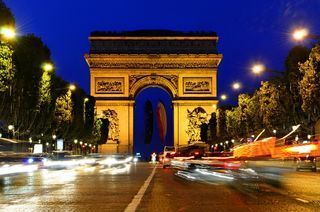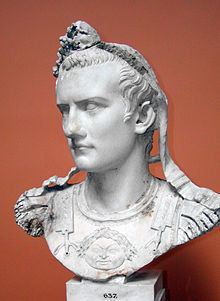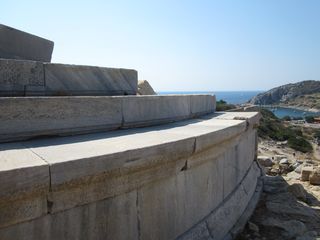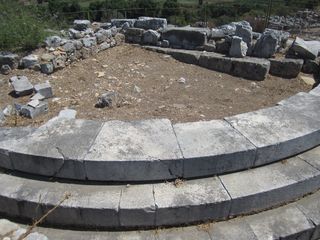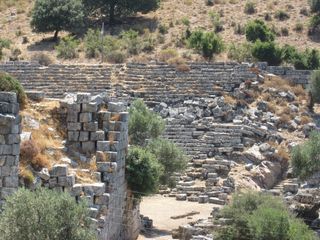Mary Beard's Blog, page 42
August 23, 2013
The story of a tweet
A few days ago I spotted one of the new M&S ads, with Helen Mirren, Tracey Emin et al. I thought it was interesting and a bit funny, especially given the clientele of M&S (to judge from my local branch) that none of them were grey haired. In truth I wasn't quite sure about Helen Mirren, but I dont THINK that her hair is its natural colour.
Now, I dont think this is the biggest issue facing the world or women today, but as advertising does affect how we think we "should" be etc etc, I gave the ad one little tweet (being careful to register my uncertainty about Dame Helen's coiffure).
This is what I wrote (sorry I haven't quite mastered the art of "capturing" tweets as they appear, onto the blog; but you can check it out on my Twitter feed if you dont believe me):
Women in new M&S ad are a great & feisty bunch. But unless I have mistaken H Mirren's blonde, don't spot a whiff of grey. Women go grey M&S!
That is ALL I said on the subject. But soon Beard's view on this ad was all over the place... in an instructive little parable about how news is made (up) and people's views constructed (and then attacked for what they never actually said). Within 48 hours I was being branded eiter as a heroine standing up for the cause of us older women, or as an academic with so much time on her hands she could afford to waste it on this kind of campaign, or as a batty old harridan who didnt understand advertising (and was being inappropriately disrespectful to Dame Helen).
This for example is what commenter in the Telegraph had to say:
"Oh dear life. What next? demanding Playboy feature septagenarians?"
So how did it happen? Well it's all a question of verbs I think.
Things started off fairly accurately. The Telegraph said that I had "criticised" M&S which wasnt exactly what I had done, but it wasnt too wide of the mark. And if you read closely you did discover that all I had said was in that one tweet. (Most of the commenters on the Telegraph site didnt read very closely -- in addition to the one I just quoted there was this: "What about ugly - even bearded - women in the ads, too? A whole new area of employment for Ms Beard..." and this: "Someone slags her off, she gets more airtime to push the censorship agenda" . . . )
So too in the Standard (who get the "Beard award for accuracy" on this one). They said my tweet had sparked a controversy (true), and they had got onto M&S about the colour of Dame Helen's hair. And they went on to have another entirely correct report of how I had (politely) crossed swords with the man on twitter who said I had too much free time (I replied that I only wished I had SOME free time).
But it wasnt quite like this in other papers. In the Cambridge News I had "hit out" at M&S. In Marie-Claire I had "slammed" the firm. And Jan Moir in the Mail (rightly pointing to the fact that they was a decided absence of size 16s too) said I had "moaned" Now THAT was one thing I emphatically had not done (though it provoked some nicely humorous support... one tweeter said that if I had been a bloke the verb would have been "observed").
By this stage the "story" had a life of its own entirely unrelated to that one tweet. There were invitations to discuss the issue on TV, to write articles...and a lot of the twittersphere weighed in without ever having noticed the little tweet that had launched it. Most of this was friendly (whether pro or anti what I hadn't actually said), but there was the predictable smattering of hater tweets (one bloke eventually took down his reference to me stuffing my saggy tits in my socks, and sort of apologised).
Well, OK, I only have myself to blame you might say. I should know by now that if I write 140 characters mentioning the word "grey" it will get picked up. But it isnt half instructive to see what happens to those characters in the game of "journalistic whispers" and through the social media ("read the bloody sources" is what we tell our students).
And I'm not sad I did it. In fact, the little storm itself demonstrates that there is an issue about (women's) grey hair in our culture -- an issue to which I am only too likely to return.
August 20, 2013
A Season in the Congo at the Young Vic
I think that it was only about ten years ago that I quite caught up with what happened to Patrice Lumumba, who was the first Prime Minister of independent Congo, after the Belgians had been more or less kicked out in 1960.
I say "more or less" because within weeks, the Belgians had supported the armed independence movement on Katanga provice of Congo (the place, of course, where most of the country's mineral wealth was) -- and within months, with the collusion of the Belgians, the President of Congo and the army leader Mobutu, the idealistic and anti-colonialist Lumumba had been deposed and sent to Katanga, where he was mudered. The UN stood by without doing very much. (That's a picture of him in prison, above.)
In 1965 Mobutu became dictator, renamed the country Zaire, ruled for more than 30 years and (indirectly) gave the world the word "kleptocracy" (that is, government by theft).
As I recall, this story was all revealed to me in the Musée Royale de l"afrique Centrale, in Brussels -- now, very anxious to discuss frankly Belgium's engagement in Congo under Leopold, but also the post-colonial history (in which Belgium's conduct was not always much better).
So when the daughter (and who's a much greater expert in Africa than I shall ever be) and I saw that The Young Vic was putting on Aimé Césaire's dramatic version of the Lumumba story, A Season in the Congo, we were very keen to go. And damn good it was too (if you can get a ticket for the last few days of its run -- do).
I'm not sure quite how nuanced or profound the Césaire text is (but maybe the history of Congo doesn't call for nuance!). But the production and staging was just brilliant.
For a start (and I know it's a trivial thing to be impressed by, but I
was) Chiwetel Ejiofor who played Lumumba had been made into an extraordinary look-alike for Lumumba himself (as you can see -- that's the production in colour below).
But the most nicely edgy thing about the show was that all the cast were black. Where we are used to whites playing blacks in the west at least, here the Belgians and others were all black actors (with added white piggy noses), and the Belgians at least spoke with toff British accents. There was a marvellous scene in which King Badouin, dressed up in a silly western king's outfit, "gave" Congo its independence, by congratulating his own country on the manifold blessings they had conferred on the land. Where other Congolese purported to be grateful, Lumumba (as indeed history recounts) laid into the colonial atrocities of the occupying power.
Meanwhile the ineffectual UN Secretary General and part-time poet, Dag Hammarskjöld, was black but clad in a bright blonde wig (to indicate he was a Swede).
The final scene of Lumumba's murder was one of the most extraordinary images of the Last Supper I've seen.. with almost everyone literally washing their hands of it.
A really memorable production.
August 18, 2013
A Roman (sort of) word play: House of the Triclinium, Pompeii.
One basic message, as I have often banged on about, is that you never lose by looking at the real thing.. you always see more if you see some ancient object in real life, than if you just look at the pictures in the books. The next most basic message is that if you look at something again and again, you see even more.
Last week I went with two of my "mobility challenged" mates to see the Pompeii exhibition, which I have seen a load of times before, and saw more in one or two objects than I have ever seen before.
The piece in question is a painting from the House of the Triclinium, one of a few from there which show a dinner party in full swing. Interestingly, this has a nicely written text above the characters (obviously contemporary with the picture, not later graffiti. And there is more to it than meets the eye.
What you have (and I am really sorry it's not a better pic, couldn't find one at all),written above the heads of the diners is a glimpse of the banter at dinner.
From the left it reads "Facite vobis suaviter".. "Have a gorgeous time". Then the guy in the centre says "Ego canto".. "I'm singing/I'm going to sing".
Then it gets more complicated.
The Latin reads. EST ITA V (then the raised hand of the diner interrupts) ALEA
The translation in the show says that this means "Yes, you go for it.."
Fine, but in order to make it mean that, you have to imagine that the Latin reads "Est ita vale", or (as the CIL has it) "Est ita valeas".
But it doesnt actually say that. There is definitely an A after "...ale", and there is no sign of an S.
I am strongly tempted to thing there is a word play going on here. "EST ITA V.." is what you first see. And your first instinct before you have looked right to the end, it to think you are going to see VALE... Except that what you see after the raised hand is ALEA, the Roman word for dice, and another firm favourite of the dinner party. So is it VALE.... or ALEA (come on lets have a game of dice)? Or both?
The guy's raised hand is the clue. And (as both the husband and the son have pointed out) another bit of the joke is that the guy's hand appears to be raised in such a way as to make a Roman V (a five)... nicely following the V (of VALE..). So it's a 5 and a V and a VALE and an ALEA..
CleVer .. eh?
August 12, 2013
Lights and nights in New York
I have just got back from a long weekend in New York, which turned into a brilliant combination of sitting in the hotel room just getting on with some uninterrupted work (not entirely helped by leaving a file at home...damn) and reading the Samuel Johnson books and sloping out to eat with mates, and to do a bit of culture.
The rather unexpected cultural highspot was a show at the Guggenheim by the US "artist of light" James Turrell. I say unexpected, because after my friend George had recommended the show, we looked it up on the web and were a bit put off by the spiel. "With their refined formal language and quiet, almost reverential atmospheres, his installations celebrate the optical and emotional effects of luminosity..." and so on.
But by this time we had decided to go, pretentious or not. And we're damn glad we did.
You probably know that the New York Guggenheim gallery was built by Frank Lloyd Wright and features a great open space in the middle, surrounded by a spiral ramp/stair. Well, Turrell had filled that open space with an intricately constructed light show, of changing colours. The idea was that you came in and lay back and enjoyed, or else sprawled on the floor. And that is exactly what we all did at 10.00 on Sunday morning. We reclined quietly for 10 -15 minutes as the hues changed above us from pink to blue and white and back to pink (marvelling also, in the husband's case, how a large bee had apparently got stuck in the protective gauze .. adding to the wonderment!).
intricately constructed light show, of changing colours. The idea was that you came in and lay back and enjoyed, or else sprawled on the floor. And that is exactly what we all did at 10.00 on Sunday morning. We reclined quietly for 10 -15 minutes as the hues changed above us from pink to blue and white and back to pink (marvelling also, in the husband's case, how a large bee had apparently got stuck in the protective gauze .. adding to the wonderment!).
They had more Turrell upstairs. And we particularly liked the ways that he had made all these extraordinary works of art out of just light (problematizing, as we soon joined in the lingo, the very nature of the art object itself). And of course every one was waiting for them to be "outed" as "just light", as happened here when a kid walked in front of one.
Anyway for us a hugely fun surprise. The husband was so taken with it all that he not only bought the catalogue, but now plans a visit to Turrell's own extinct volcano in the Arizona desert.
So all in all a successful working holiday, at my favourite Library Hotel.
And, by the way, any hoteliers reading this (??). If the Library Hotel can have multi-purpose international (UK/US/Euro/Aus) power sockets in its wall, why cant you all?
August 9, 2013
The damn footnotes
I know what I like, and don't like, in a footnote: an accurate and precise reference to what ever is being discussed (I mean not a reference to Smith (2008), when Smith (2008) is a book of 1000 pages -- but Smith (2008) 245-47); a certain modesty (not a vast multi-lingual bibliography of modern theoretical works, semi-relevant to the topic, designed only to display the learning of the author... you know 'the seminal work in Slovenian remains..'); and value-added wit (I like a footnote to reward those who bother to consult it with an extra bit of thought-provocation and humour).
But it is one thing knowing what one likes, quite another actually managing to do it oneself.
I have spent the last week or so trying to complete and check the footnotes from my book of the Sather lectures (on Roman Laughter), now long overdue. And a rather gloomy experience it has been.
For a start, I did try -- so far as I could -- to write the footnotes, as I was writing the first draft of the main text. That is drop-down sensible. In fact, there are a few occasion where I was obviously in such a rush in writing at round one, that I decided just to crack the main text down and leave the notes till later. There was just a blank at the bottom of the page. The process of trying to reconstruct what I thought I was going to put in the notes is vastly time-consuming, and sometimes defeating. Earlier this week I was reduced to going up to a colleague in the library and saying, "Who do you think I was actually referring to when I wrote this??" (luckily he knew).
But even where I have drafted the notes already, it becomes all too obvious in retrospect that it is hard to keep to the same standard (between the anal and the cavalier). In fact I looked with horror at what would have been the first footnote in the book. I kick off with an anecdote about Dio Cassius in the Colosseum, trying to stifle his giggles at the "antics" of the emperor Commodus in 192 CE/AD. What was the first note in my draft? A long and learned disquisition on the exact name of Dio Cassius. Was it relevant? No, it wasn't. Blue pencil ....
The other issue, as I said, is accuracy. I have a rule of thumb in published work: that roughly 30-50% of footnotes are not right in some way. Either the reference in question does not really prove what is claimed, or it is simply wrong (in the sense of being mis-copied or a typo or whatever). "Let she who is without sin....." you might say. So I have been enlisting the (paid) support of a junior member of the family to check each and every one of the damn things.
And time-consuming it is too... about a chapter a week, if there are no more serious errors than usual. Imagine our distress (that is putting it mildly) when earlier in the week we found we had lost the single corrected hard copy of Chapters One and Two .... Not a good moment for Beard, who truly lost her rag.
The good news was that the pages were actually all safe as houses on one of the tables in the Faculty Library. Phew, but a nasty, nasty moment for Beard and son.
August 6, 2013
No visa for Paris...for one night!
Some of you will have kept up with the fact that we have been "hosting' (in a low key way .. he has really been hosting himself) a friend of the daughter's from South Sudan. Samuel has been doing a Master's course at the University of Westminster, in English as a foreign language (on a scholarship . which he wanted to take up, because English is the official language of South Sudan, yet most children there don't have it as their mother tongue).
We have got to know Samuel well over the last nine months. And to celebrate him submitting his dissertation, we promised we would take him for a trip to Paris. There were various reasons for this. Noone knows when, if ever, he will be able to come back to Europe, and we felt very keen that he should see another European country while he was here (partly so that he had that experience, and could share it, when he went back to teach in South Sudan). But the fact is that in his home country, Samuel had done the history of Napoleon for A level. He actually knows rather more about the Arc de Triomphe than we do, and we wanted to show him what it was like face to face.
We cant, because he has been refused a visa to go to Paris for just one night.
This is the story.
I booked a return ticket for Samuel (along with all the family) from London to Paris and back; I also booked and paid for a hotel. Samuel booked health etc insurance for himself. He took all these documents along for his interview. Yet even so the visa refusal comes back saying that his visa application has been turned down:
"you have not provided proof of sufficient means of subsitence , for the duration of the intended stay or for the return to the country of origin or residence, or for the transit to a third country into which you are certain to be admitted, or you are not in a position to acquire such means lawfully"
Now hang on. I accept that I wasn't there at Samuel's interview, so I don't know exactly what took place. But, so far as I know, he produced a return ticket on the Eurostar, a paid hotel booking and insurance documents. How many pounds did he have to have in his bank account for heavens sake to show that (even without his English "family") he could support himself in Paris for just over 24 hours?
I feel at a total loss. Samuel applied in very good time (well over 6 weeks ago I think), but there is now no time for us appeal to the postal address in Nantes. I have emailed the French consulate (and am hoping for a reply), but I am not optimistic about the reply (if I get one). I now feel guilty that I didnt provide a formal letter of guarantee --but it was only a night, I thought.
If anyone has any bright ideas, please help.
What good is this serving... a young man from South Sudan (a country that needs all the help we can give it), wants to go for one night to Paris, provides ample evidence that he has return travel and accommodation .. and is still refused a visa.
Samuel, I know, is hugely grateful for the scholarship that has brought him here. But I can only imagine that the refusal to allow him to go to Paris for a day and a half will give him a sad taste in his mouth.
And it is surely bonkers.
August 3, 2013
So how was "Caligula"?
I am posting this in slightly inauspicious circumstances. I just got one of those Twitter threats... "Your house will be blown up at 10.47 tonight....". Others have received these. But even though they have proved empty, it is still rather unsettling. And I suspect that, just to be on the safe side, I will be getting the family in the garden at 10.45. That's how it gets to you.
All the same, I really wanted to blog about the reactions to the Caligula programme before A A Gill got his word in. (My prediction? He'll probably ignore. Or he'll take a few more pot shots at my attire and appearance (possibly comparing me unfavourably to the lovely Michael Scott, one of my mates). Maybe he might make a newsworthy recantation... doubt it!
What I wanted to say was how fascinating -- and sometimes surprising, and sometimes really educational -- it is after spending so long making a TV programme to see how people react.
I am grateful for so many appreciative emails (and also for all the emails that argued fiercely with some things I said .. that was great too). And I am grateful for all the appreciative and thoughtful press notices.
Can I say (without seeming too southern metropolitan) how struck I was by the acute (positive and less so) reviews in papers all over the land. I loved the review in the Scottish Herald which said that I shouldn't have been driving a car at the same time as doing a TV commentary (if you cant use a mobile phone, then...!?). They had a point I thought! And there was a piece in the Western Morning News which saw exactly what we were trying to do at the start of the programme.
Then there were the individual comments, via email, Twitter or websites. Some of these were just great (and I dont mean necessarily favourable, but sometimes with serious objections to make..which we've been arguing about since). But there was also a rather dreary underbelly.
The two comments on Digital Spy made my heart sink.
The first asked: "In whose Temple of Venus would you erect your obelisk? Mary Beard's or Catherine Edwards's?"
The second was even worse for me: "I like to think I'm above judging people on their appearance, but Mary Beard is so horrendous and unkempt that I now switch off anything I see her in. It's not just that awful hair, either. The way she gurns and slumps around the screen is very unappealing, and that's before getting to her Wikipedia-lite level of knowledge."
Ok, it's the usual stuff about the looks (I'm 58 right?). But what's this "wiki-lite" stuff. I feel like saying I have studied Caligula and the Roman empire for 40 years or so, I'm a bloody Prof of Classics at Cambridge... you might not like what I am saying (that's fine...), it might actually be worth debating, but it isn't "wiki-lite".
And there was more of that. One generally positive comment on the Telegraph website today said:
"I like watching Mary Beard on TV especially when she is discussing Roman history. But in all honesty I don't think she is a very good historian, although her take on Roman history is different and at times, interesting."
I thought this was partly very nice. But what did s/he mean by saying "in all honesty I don't think she is a very good historian"?.. is it that people might disagree? Well sure..but who is going to count as a "good historian" (help, am I showing my anxieties here?)
Of course, none of this matters very much. After all, it's all about the long dead Caligula. But (given the trolling of this week) it seems that there is a continuum between the sexist abuse and the way people prefer to say "she's a crap historian" rather than "I dont agree with her, for the following reasons...".
But many thanks to the many who did say "I dont agree". with arguments.
Meanwhile I go to bed wondering what Mr Gill will have done. And -- damn -- I am supposed to be boycotting Twitter tomorrow. Rage....!
July 31, 2013
Jurors and the internet
I have been having a rather jam-packed week, what with Caligula and the trolls. But I dont want to forget a case that made the news a couple of days ago -- the one about the two month prison sentence given to a juror who researched the case he was hearing at home in the evening on the internet.
Now I dont want to comment on the rights and wrong of this case (brief newspaper reports never give you enough information to decide what you think about the fairness, or otherwise, of the sentence). But as soon as I heard about it, it reminded me of a conversation I had had on a train a few months ago.
The man opposite me happened to be a judge, and we fell to talking about the nature and the problems of jury trial. At one point in the conversation, I said that I reckoned -- that if I were a juror (and I never have been) -- I really could see myself doing a bit of googling in the evening. I would know that I shouldn't, and I wouldn't tell my fellow jurors, and I would feel rather guilty and shifty about it (and get paranoid that the jusge would haul my laptop in for examination), and all the rest. But I just knew in my bones that after a curious day in court, with nothing to think about but the oddities of the case (and/or all the work of my own that wasnt getting done), and after have a bottle of Pinot Grigio over supper, I probably wouldn't be able to resist the temptation of a quick internet trawl.
He came down on me like a ton of bricks -- as, I know, was absolutely right and proper. That would be contempt, it would overturn some of the fundamental principles of British justice, it could land me in prison, etc etc.
And indeed that is exactly what happened to my namesake (the man sent down for two months was also called Beard -- no relation so far as I am aware).
But I still cant help wondering if we have to think a bit more radically about jury behaviour in "the internet age".
In the old days, it was easy enough to stop jurors accessing information that wasn't presented in court. A trip to the local library to go through back issues of newspapers would not only have probably been fruitless, it would have represented a determined (and public) search for illicit information, that a quick Google trawl after supper does not. I cant ever imagine having been tempted to do it.
But now it is just so easy to access the background, at the prompt of a single momemt of curiosity. And the more curious the juror is (and don't we want curious jurors?), the more likely in practice s/he is to undertake a bit of private investigation, no matter what the judge says (lets be honest! I really dont think that I am much out of line with most people's behaviour here).
The danger of sticking to the present position, as laid out by my judicial friend, seems to me to be that "extra-information gathering" on the part of the jurors simply goes underground. Only the very foolish will let on they have done it, but at least half of those twelve good (wo)men and true will have found out things that they will be bringing to the jury table -- but noone will know what they are, or whether they are even correct. Many jurors, in other words, will be influenced by a penumbra of information and misinformation that they wont possible to allowed to fess up to -- which seems somehow a lot worse than going to the information in the first place.
Dont we need to find a way of managing jurors' "natural" 21st century behaviour, and of having a bit of transparency here, rather than simply turning a blind eye to what must be going on (and which a few deterrent jail sentences isnt likely to stop). Shouldn't we perhaps encourage them to say what other information they are bringingto the table, and allow it to be challenged?
Or, if we really feel that the jury should access no external information at all, then we have to do what sometimes happens in the States, they have to be sequestred.
(I realise, of course, that -- after this post -- if I were ever to be called for jury service, I would be an obvious target of the judge's strictest attention. So let me promise now to the forces of the law that if I am ever to serve, I promise, whatever my worst instincts confessed here, that I wont break the rules: no Pinot Grigio or laptops out in the evening.)
July 28, 2013
The goddess of Love: close up on Knidos
I'm writing from Istanbul airport to report back on my visit to the sanctuary of the goddess of Love at Knidos (as promised last week). The idea was to go and see whether the round building excavated there in the late 60s/early 70s really did look as if was the famous temple that housed the famous nude statue of Aphrodite by Praxiteles.
The answer, of course, turns out to be a bit inconclusive.
The best way to get to the site is actually by boat (pic below), and we went from Bodrum. The ancient city was obviously fairly substantial, and you have to climb up a fair way through the ruins till you get to the circular structure that Iris Love uncovered and pinpointed as the home of the statue.
One thing that supports the idea of this spot as THE SITE is its prominence. If you had a really celebrity work of art, you could put it here and it would be marvellously visible from each the two harbours that lay on either side of the town (on the right you see the view from the temple down into the harbours, to left and right -- and the goddess was "Aphrodite Euploia", after all, "Aphrodite of Good Sailing")
it would be marvellously visible from each the two harbours that lay on either side of the town (on the right you see the view from the temple down into the harbours, to left and right -- and the goddess was "Aphrodite Euploia", after all, "Aphrodite of Good Sailing")
I flirted with the idea that this great location might not really be its original home (so far as we can tell the circular structure doesnt go back to the fourth century BC, when the statue was made), but maybe it was where it went when it became the symbol of the city -- moved to the position of prominence once it had become mega-famous. I also had a feeling that the rough surfaces you can just see in the picture at the top of this post might one have held nicely gilded, sparkly stucco. So it really shone out across the sea.
And then there is the fragmentary inscription found nearby, which appears which may feature Praxiteles' name. At least it still sports the words "Prax..." and "gym.." which may be the start of the Greek word for "naked"; so it could be a notice advertising the famous work of art. (We looked for this text both by the temple itself, and in the collection of fragments by the entrance to the site, and later in the museum at Marmaris -- which was closed but we blagged our way in; but not a sign of it.)
But there are still some serious problems.
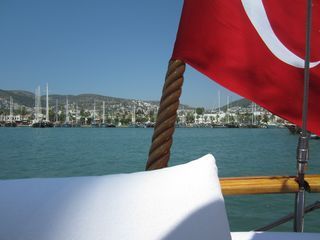
For a start, the temple was only identified by Love thanks to the look-alike at Hadrian's villa at Tivoli. It does match the ancient descriptions we have up to a point (the idea that the Aphrodite could be admired from all angles fits a circular structure... but noone actually SAYS it was circular).
But only up to a point.(Pseudo-)Lucian, for example, goes on and on about the gardens that surrounded the temple of the goddess. But it was hard to see where these might have been (there was hardly room for more than a few hanging baskets). And the centre of the structure had been crushed by rocks falling from above, which made it impossible to see how the inside of the building had worked at all. Love claimed that she had found a slightly over life-size marble finger in the rubble -- Aphrodite's?
But there was a sequel.
The odd thing was that we went on from Knidos to Kaunos, an ancient city not too far away. And there we found another circular structure (pictured above) in a position closely analogous to the temple at Knidos. This, archaeologists claimed, was the base for some astronomical device. It appeared to have had no permanent structure on top, so seems more likely to have been a support than a building. But then I reflected that we didnt really know 100% for sure what was on top of the base at Knidos. So maybe these  things were some distinctive local bit of urban planning -- related or unrelated to the famous statue.
things were some distinctive local bit of urban planning -- related or unrelated to the famous statue.
By the way, if you ever get the chance to visit Kaunos, the approach is heavenly -- by boat, through reed beds and turtle breeding grounds. And overall it's a five star site, with a smashing theatre, as you see below (as seen from the strange circular structure).
July 22, 2013
Bikes versus cars: the Cambridge experience
So far as the rules of the road go, there seems to be one basic principle: when you are driving a car you hate bikes, when you are riding a bike you hate cars (and I guess pedestrians hate everyone).
There is an obvious difference of perspective built in here. It wasn't until I started to drive a car (almost 20 years after I had first whizzed round on a bike) that I actually realised that you could not see a cyclist at night without lights. In fact I now want to shout at late night cyclists without lights (like motorists once did at me): "You'll get killed, sunshine, I can't see you."
The problem is that cyclists do ride headlong into danger. It's not just not having lights. It's biking on pavements (and so threatening to mow down a load of innocent pedestrians in the process) and biking blithely down one way streets the wrong way.
I confess that I do bike the wrong way down a one way street sometimes. My (feeble) defence is that I try always to do it as if I know I was doing wrong. That is slowly, with an apologetic look on the face, and ready to get off at any minute. I cant bear the guys (usually, but not always it is guys) who do it as if they owned the place, and at high speed.
So cyclists are not entirely innocent. But the dice are stacked against them, because the bottom line is that a car or a lorry can kill a cyclist and not vice versa. And motorists are too confident that they are in the right. Even when they are wrong, as I just discovered.
A cfew days ago we -- that's me and the husband -- took a cab to the station. Chat with the driver fell to the evils of cyclists, to the lack of training given by foreign languages schools (true, many of them do seem to let the students out on the road with precious little preparation), and their misunderstanding of the highway code.
Sometimes, he conceded, the cycle tracks do mislead them. I thought he was referring to the end of our road in Cambridge, where suddenly the cycle track in the middle of the highway just disappear and motorists are encouraged to cross it. What, I have always wondered, is a cyclist supposed to do if a car just cuts them, as is apparently allowed.
But no, he was referring to a standard road junction.. to which we were just arriving (from a side road). Look, he said, pointing to the main road, that cycle track suggests they do have the right of way, when they come up Station Road, but they dont.
Had I been brave enough , I would have said that (cycle track or no cycle track) they DID have right of way. They were on the main road, he was coming up on the minor intersection. But I fear I chickened out. The fact is, though, that this Cambridge cabbie (and I am sure it's not true for all Cambridge cabbies ) thought he -- as a car driver -- had right of way at a junction, even when he was on the minor road. And I am sure if I had explored further, he would have thought all other falsehoods about how cyclist were supposed to give way to him.
Cyclists beware!
Mary Beard's Blog
- Mary Beard's profile
- 4110 followers



